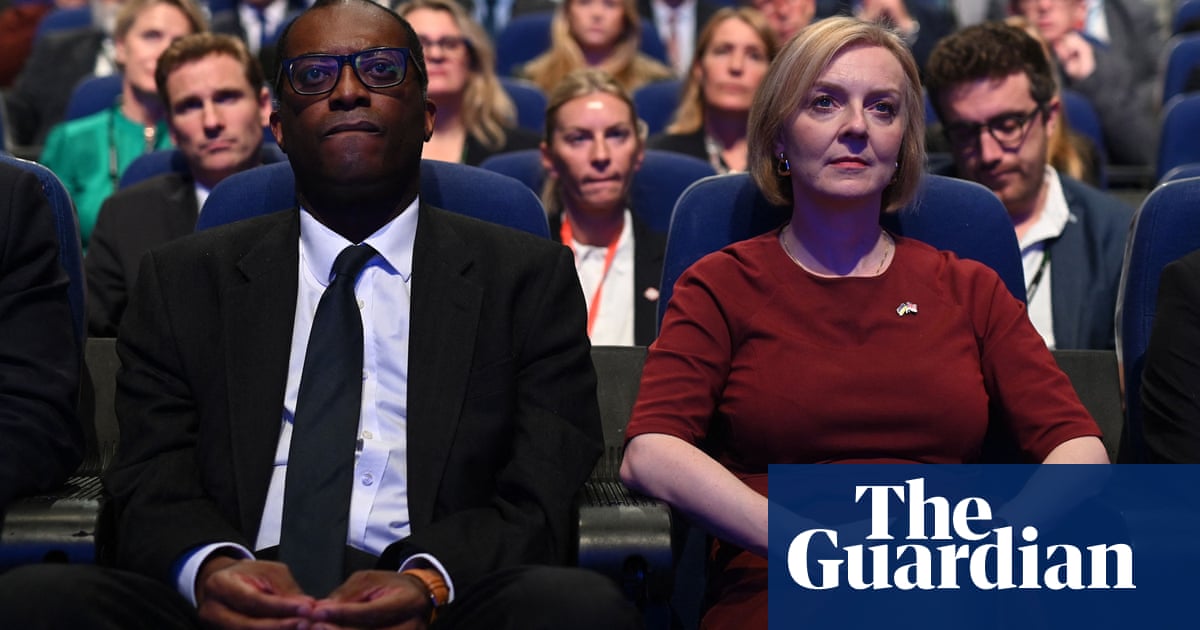
Conservative MPs were furious with Liz Truss and Kwasi Kwarteng as the pound continued to crash on Monday, with some talking of a new leadership contest and others terrified that replacing her would lead to an early election.
Tory backbenchers – many former supporters of Rishi Sunak – expressed deep concern that the new leadership team had already lost them the next election, with one Conservative MP even saying he was looking forward to entering opposition as “this madness has got to end”.
Others were openly speculating about whether Truss could be ousted by a fresh vote of confidence, although she could not be removed under the current leadership rules for another 12 months, or challenging the government by voting down the finance bill.
However, several centre-right Conservatives who survived Boris Johnson’s cull of the moderates in 2019 said they were very concerned that the whip would be removed from those who spoke out against Truss or tried to vote down her finance bill, destroying the “one nation” wing of the party for good at the next election.
Few MPs spoke out on the record for fear of talking the pound down further, with the former chancellors Sajid Javid and Rishi Sunak keeping silent. But their predecessor George Osborne tweeted in praise of the decision to commission independent forecasts from the Office for Budget Responsibility, which Kwarteng had resisted at the time of his fiscal event on Friday. “Good to see the government now taking steps to recognise the value of the UK’s central economic policy bodies – crucial to credibility,” he said.
Conservative MPs from the one-nation wing of the party said they were particularly worried that the tax cuts set out by Kwarteng had severely undermined the Tories’ record on economic competence, opening the field to Labour.
“Tax cuts in a traditional Tory way have always got to be self-financing,” said one Conservative MP. “He makes Tony Barber look like Mr Gradgrind. It’s utterly absurd,” they added, in a reference to the ill-fated budget of 1972, which ended in boom, soaring inflation and ultimately the demise of Ted Heath’s premiership.
But the MP maintained it would be “impossible to countenance another leadership election this side of a general election” unless a new leader went to the country. “And why bother?” he said. “Because the mindset of grassroots Tories appears to be ‘go for the ideological purist and not the common sense realist’. You can have as many leadership elections as you like. You are only going to end up with the nutter winning.”
Kwarteng’s camp put on a brave face, with the chancellor declining to comment on market movements as the pound hit an all-time low against the dollar. Government sources also insisted that Truss and Kwarteng were still on the same page in relation to sticking to tax cuts, including the abolition of the 45p rate.
However, some Conservative MPs were talking of rebellion and potentially voting down the finance bill if there was no U-turn. Others thought it would make the situation worse and they should give her and Kwarteng more time to row back or take remedial action.
A former minister said chatter had begun among colleagues about when they might submit no confidence letters in Truss. “There will come a time when people have to say: ‘I know it’ll make us look chaotic, but we can’t go on like this’,” they sighed.
The MP added: “Early in the new year, if intermediate outcomes fail to suggest Truss’s project is working, she’s going to have to do something – that could be throwing Kwasi to the wolves, or else my colleagues will take some sort of action.”
Another Tory MP said they had “never, ever known the parliamentary party so unmanageable”, adding: “There’s an arrogance to this government’s approach that has hitherto never existed.”
They added because Truss is immune from a no confidence vote until September 2023, she was certain to lead the party into the next election, so instead her allies – Kwarteng, the No 10 chief of staff, Mark Fullbrook, and the chief whip, Wendy Morton – would be targeted instead.
Since the budget on Friday, financial markets have been dominated by speculation that the Bank may need to increase rates by as much as 1 percentage point to 3.25% to steady the falling pound, less than a week after a rate rise to 2.25% and before its next scheduled meeting in November.












